Except that it wasn't.
Without going into a lot of extra pointless verbiage Olav and I were in a record store and I was rooting around the cheap bins. Rather than stand around Olav decided he'd look too, and in short order he emerged with a copy of BB Gabor. "Oooh," I said, "that's cool, put it on the pile." Yeah, it was a fruitful day and there was a pile ... except this one never made it to the pile. "I'm getting this one." said my rather impish friend. As our visit went on he found a couple more things that ended up on my pile, and when we'd paid and left, he handed me the record. "Here, this is for you."
I have good friends.
As we were out of town at the time I wasn't able to listen to the record, so I decided to break my own house rules and just stream the album before playing it in the basement. I came up empty. Oddly his two albums aren't out there to stream so I figured I'd pass some time and look him up instead. There would be a wiki page, there's always a wiki page. Turns out his family had escaped the Hungarian revolution, and eventually he and his family settled in Canada. His debut album was recorded in 1979 and released in 1980 (there were more than a few bands who waited so they could be part of a new decade and not be relegated to the old one). The album was produced by the now legendary Terry Brown (Stampeders, April Wine, Gowan, Blue Rodeo, Max Webster, and oh, Rush), and B.B. Gabor managed to chart a couple of singles and was up for a Juno award. I suspect it was the cursed "Best new artist" category. Then in '81 he'd release a follow up Girls of the Future which he self produced. The album apparently didn't leave much of a mark, and after a while he was without a label, and after working with Todd Rundgren in the mid '80s a third album never materialized. Sadly in 1990 his body was discovered in his apartment and his death was ruled a suicide.
This all made me kind of sad, and it cast a bit of a pall at first over the listening experience to be honest. I mean here I am discovering an album that at the time was meant to be the opening chapter in a career and it's kind of a melancholy feeling hearing these songs knowing how things would turn out.However, rather than dwell on the darkness, let's celebrate the light and life of an artist who left if all in the grooves.
The album kicks off in a big way with "Metropolitan Life" and then moves into "Consumer" both songs taking shots at commercialism. "Soviet Jewellery" is the first of several scathing digs at Russia on the album, and it's probably the song he's best remembered for. "Laser Love" is a strange new wave tinged song where the lyrics aren't really much more complicated than repeating the words laser love, over and over ... and over. The first side closes out with the interesting folk styled "Moscow Drug Club" where the reds play the blues.
I have to say the album is definitely eclectic, and it's kind of cool an album like this was even made at all. If you're looking for a straight ahead rock album this would have definitely been a bit of a head scratcher. I'm pretty sure if I'd had this in 1980 I wouldn't have known what to do with it. As it stands now, I can really appreciate the creativity here, and there are just enough moments of pop magic to appeal to people who are looking for a hook. I do love a good hook.
The album closes with probably the second best Joni Mitchell cover I've heard. You really can't get better than Nazareth, but BB Gabor's version of "Big Yellow Taxi" is a wicked mid-tempo re-arrangement that totally encapsulates the entire album.
Listening to this one, you really do get the sense he was just getting started, and BB Gabor had more up his sleeve.
After a couple of killer pop songs he moves back into the weird new wave vein with "Fidgety Pete" and the passing years have not aged this one favourably. Let's just leave it at that. They can't all be winners.
"Girls of the Future" is another futuristic new wave song where the girls of the future will be manufactured to be obedient and programmed to serve. Again, musically pretty straight ahead but considering this was the title track, it was kind of a swing and miss ... okay maybe not a miss, let's just call it a foul ball. "Othello" closes out the first side, and it's a slow burn with some really nice guitar work. So far this has been a pretty solid.
The second side, opens with "Jealous Girl" written by Ken Basman and Leon Stevenson. Leon Stevenson had co-written the rather unfortunate "Fidgety Pete" so this was a nice bit of redemption. The song is really good, and is followed up by the wonderfully haunting "Outsider" which should have been a single, and honestly was ahead of the curve musically. It's probably my favourite song so far. "Shake" is a song I'm not sure I like but it sure is catchy. I wonder if the guys in The Pukka Orchestra heard this song, as there's something about it that reminds me of "Flies (As Big as Your Fist)" from their 1984 debut.Building on the alternative elements of "Shake" things go deeper into the outrageous with "Simulated Groove" where the deep talking narrative voice from his debut album makes a return visit. While it's not a song I particularly enjoyed as part of the whole it's just fine. Things get back on track with "Turn, Table, Turn" an uptempo new wave infused song that sets the stage for the album's closing track "When You're the Only One I Love in this World" a song that's rooted in late '70s pop complete with the dual tracked lead guitar break. It ties the album's themes together, and then the tone arm is back in the cradle and the album is over.
It was truly over. There would be no follow up.
The only song that can be streamed is an instrumental piece called "The Cross" that may or may not have been part of the Todd Rundgren sessions in the mid '80s. It was released after BB Gabor's death, so we may never know.Like so many Canadian artists who's work remains locked in a vault somewhere, BB Gabor's work remains lost to the streaming generation. At best BB Gabor is a footnote in the 1981 Juno Most Promising Male Vocalist of the Year category where he, along with Bryan Adams, lost to Graham Shaw - a guy who is his own footnote in history.
At worst, he's just forgotten.
Never assume the worst.
B.B. Gabor (1948 - 1990) Gone, but not forgotten.
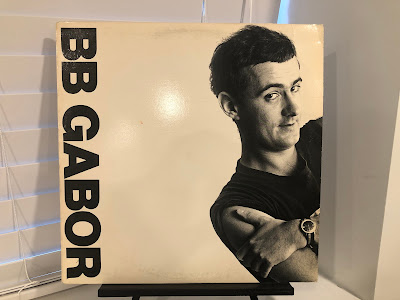
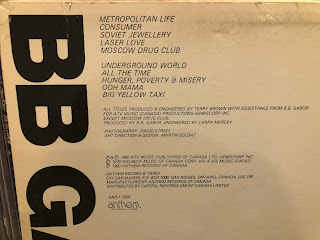
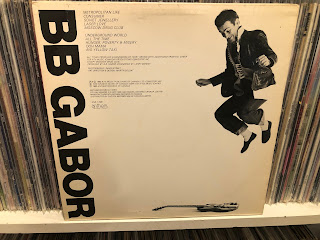
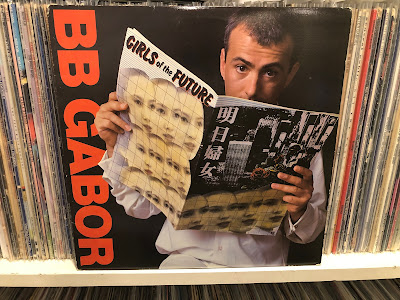
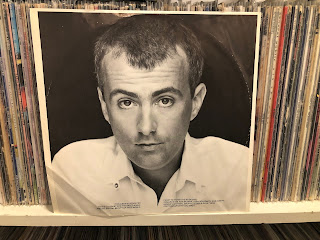
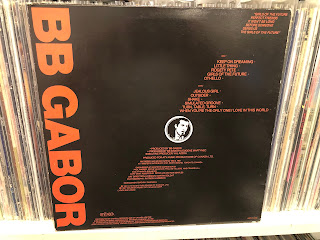
Comments
Post a Comment